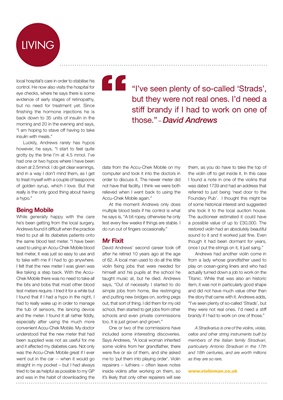
LIVINGLIVING
local hospital's care in order to stabilise his
control. He now also visits the hospital for
eye checks, where he says there is some
evidence of early stages of retinopathy,
but no need for treatment yet. Since
finishing the hormone injections he is
back down to 35 units of insulin in the
morning and 20 in the evening and says,
"I am hoping to stave off having to take
insulin with meals."
Luckily, Andrews rarely has hypos
however, he says, "I start to feel quite
grotty by the time I'm at 4.5 mmol. I've
had one or two hypos where I have been
down at 2.5mmol. I do get clear warnings,
and in a way I don't mind them, as I get
to treat myself with a couple of teaspoons
of golden syrup, which I love. But that
really is the only good thing about having
a hypo."
Being Mobile
While generally happy with the care
he's been getting from the local surgery,
Andrews found it difficult when the practice
tried to put all its diabetes patients onto
the same blood test meter. "I have been
used to using an Accu-Chek Mobile blood
test meter, it was just so easy to use and
to take with me if I had to go anywhere.
I felt that the new meter I was given was
like taking a step back. With the AccuChek Mobile there
was no need to take all
the bits and bobs that most other blood
test meters require. I tried it for a while but
I found that if I had a hypo in the night, I
had to really wake up in order to manage
the tub of sensors, the lancing device
and the meter. I found it all rather fiddly,
especially after using the much more
convenient Accu-Chek Mobile. My doctor
understood that the new meter that had
been supplied was not as useful for me
and it affected my diabetes care. Not only
was the Accu-Chek Mobile great if I ever
went out in the car -- when it would go
straight in my pocket - but I had always
tried to be as helpful as possible to my GP
and was in the habit of downloading the
data from the Accu-Chek Mobile on my
computer and took it into the doctors in
order to discuss it. The newer meter did
not have that facility. I think we were both
relieved when I went back to using the
Accu-Chek Mobile again."
At the moment Andrews only does
multiple blood tests if his control is what
he says is, "A bit ropey, otherwise he only
test every few weeks if things are stable. I
do run out of fingers occasionally."
Mr Fixit
David Andrews' second career took off
after he retired 10 years ago at the age
of 62. A local man used to do all the little
violin fixing jobs that were needed for
himself and his pupils at the school he
taught music at, but he died. Andrews
says, "Out of necessity I started to do
simple jobs from home, like restringing
and putting new bridges on, sorting pegs
out, that sort of thing. I did them for my old
school, then started to get jobs from other
schools and even private commissions
too. It is just grown and grown."
One or two of the commissions have
included some interesting discoveries.
Says Andrews, "A local woman inherited
some violins from her grandfather, there
were five or six of them, and she asked
me to 'put them into playing order'. Violin
repairers - luthiers - often leave notes
inside violins after working on them, so
it's likely that only other repairers will see
them, as you do have to take the top of
the violin off to get inside it. In this case
I found a note in one of the violins that
was dated 1739 and had an address that
referred to just being 'next door to the
Foundary Pub'. I thought this might be
of some historical interest and suggested
she took it to the local auction house.
The auctioneer estimated it could have
a possible value of up to £30,000. The
restored violin had an absolutely beautiful
sound to it and it worked just fine. Even
though it had been dormant for years,
once I put the strings on it, it just sang."
Andrews had another violin come in
from a lady whose grandfather used to
play on ocean-going liners and who had
actually turned down a job to work on the
Titanic. While that was also an historic
item, it was not in particularly good shape
and did not have much value other than
the story that came with it. Andrews adds,
"I've seen plenty of so-called 'Strads', but
they were not real ones. I'd need a stiff
brandy if I had to work on one of those."
A Stradivarius is one of the violins, violas,
cellos and other string instruments built by
members of the Italian family Stradivari,
particularly Antonio Stradivari in the 17th
and 18th centuries, and are worth millions
as they are so rare.
www.violinman.com
"I've seen plenty of so-called 'Strads',
but they were not real ones. I'd need a
stiff brandy if I had to work on one of
those." - David Andrews"